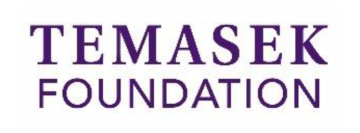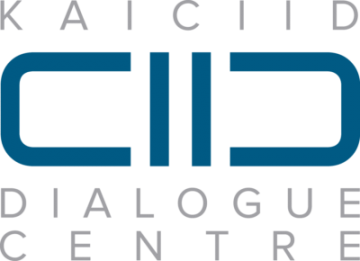Interreligious Dialogue
Challenge
Interfaith reflections and peaceful connections Invite your Scouts on an enlightening road of spiritual development where they will learn how to connect with their own faith, discover different faiths, and develop an active participation in interreligious fraternity.


Bridging beliefs through dialogue
“In the Scouts, each form of religion is respected and its active practice encouraged, and through the spread of our brotherhood in all countries we have the opportunity to develop the spirit of mutual goodwill and understanding.” (Baden-Powell 4th International Conference Kandersteg, Switzerland (1926).
Interreligious dialogue, also known as interfaith dialogue, involves people from different religious backgrounds working towards understanding, respecting, and learning from one another in spite of their differences. It provides a platform for individuals to engage in meaningful conversations, exchange ideas, and challenge misconceptions. It aims to foster understanding, respect, and harmony among people of different faiths. Respecting diverse religions and cultures is about recognizing their existence and embracing the differences.
By promoting dialogue, we can bridge the gap between these differences effectively, find common grounds, promote tolerance, and work towards building a more inclusive and peaceful society where diverse religious beliefs are valued and celebrated.
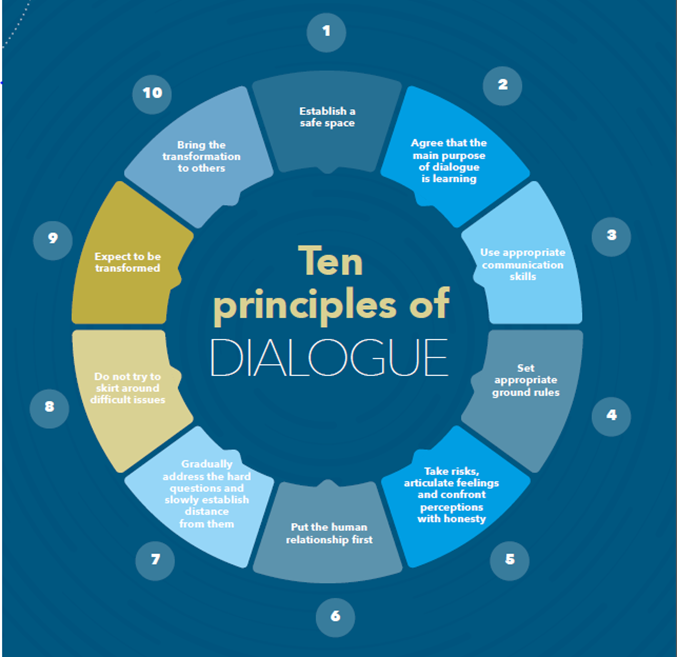
Why the Interreligious Dialogue challenge?
The Interreligious Dialogue challenge offers young people, in the older sections of Scouting, an opportunity to discover, understand and make friends in an (inter-)religious world. It encourages them to grow in spiritual responsibility by living out their:
- Duty to God by being actively involved in their religious tradition;
- Duty to others by being actively engaged in interreligious friendships and dialogue with other members of the human family;
- Duty to themselves by developing their responsibility for their own growth of faith or religion.
As a final step in the challenge, a community service project must be implemented by the young people applying for the badge. Creating a service project is main goal of the challenge, where young people can put the knowledge and skills they gained into practice, leaving a positive imprint on the community.
By participating in the Interreligious Dialogue Challenge, young people will be introduced to various religions and faiths, feel more spiritually developed and fulfilled, and learn to use the 10 Principles of Dialogue to promote harmony among different faiths.
The learning process
The Interreligious Dialogue challenge takes young people on the learning path of “Peacebuilding”, where they will progress through four main milestones:
- Listen means discovering your identity and other people’s identity, culture and beliefs.
- Understand where thoughts and emotions come from, their previous experiences and personal biases, and acknowledge other peoples’ experiences, needs, and perspectives.
- Engage to create more peaceful communities by recognizing how personal actions affect others, identifying problems in their community, and coming up with ideas to fix them.
- Collaborate with others by applying the 10 Principles of Dialogue, build on shared interests, and engage to bring dialogue to others in their community.
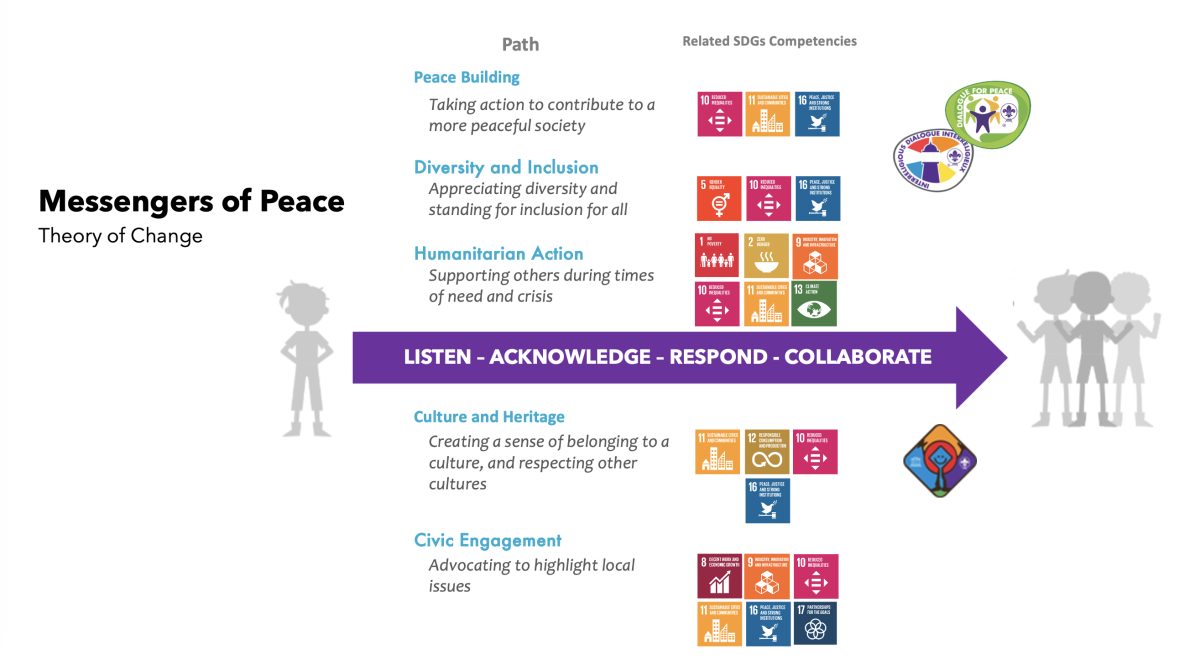
Young people can combine the Interreligious Dialogue challenge with other challenges focused on peacebuilding, to complement their journey through Messengers of Peace
The journey to receiving the badge
- The exploration stage: Young people engage in activities based on the core concepts of interreligious dialogue, which allows them to discover more about their religion and different faiths.
- The reflective action stage: Throughout the challenge journey, participants journal and log hours, which is followed by an ongoing reflection exercise. Participants are then required to complete a community service, during which time their values and skills are deepened and developed. At the end of the challenge, a young person may choose to participate in a network of support that encourages interreligious friendship within and outside of Scouting.
To earn their Interreligious Dialogue challenge badge, a young person must follow the below process with the support of their adult Leader.
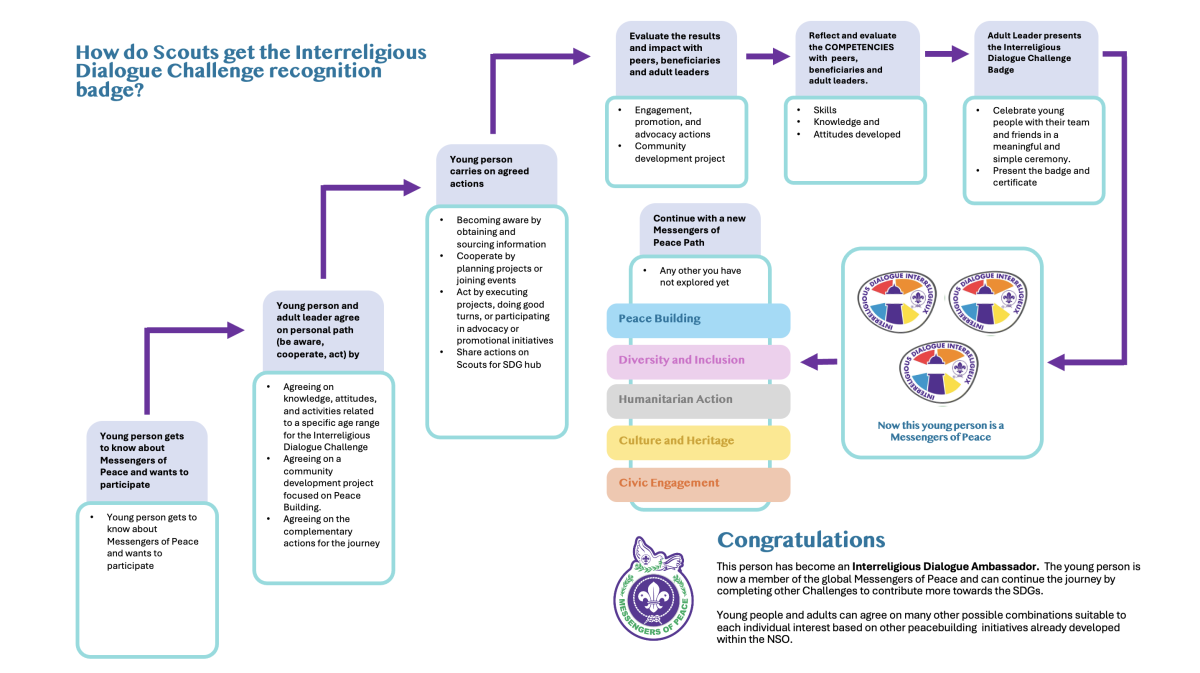
Upon completion of all the activities and the community project of a challenge, the young person will become a member of Messengers of Peace, and be recognized as a global citizen for peace, and receive their challenge badge.
Both young people and adults can explore various combinations suited for each individual's interests, drawing from other existing peacebuilding initiatives within the NSO.
Who can join the challenge?
This challenge is for young people aged between 16 and 21, who wish to improve mutual understanding and deepen their knowledge of themselves and others. Their main goal is to find shared values and common ground on various topics, within a spiritual and interreligious framework.
It is recommended that young people complete the Dialogue for Peace challenge first as it provides a basic understanding of dialogue, while the Interreligious Dialogue challenge takes them further into the application of dialogue to promote peace, coexistence, mutual respect, and friendship among different religious communities.
Please note: NSOs may specify which section(s) are most appropriate for their NSO but must adjust the suggested activities and methodologies to age groups outside this range.
Learning Objectives: What young people will learn along the way
The learning objectives of each challenge are designed not only to educate and inspire but also to empower individuals. They are structured to guide participants through a personalized journey tailored to their age, ensuring that their knowledge evolves from one activity or project to the next. This approach builds competencies for sustainable development and empowers young people to lead positive change.
The challenge aims to help young people become capable, confident, and committed to spiritual and religious development by engaging in interreligious dialogue and friendships.
By the end of this challenge, participants will be able to:
- Develop their spiritual responsibility by living out their duty to God, to others, and to themselves.
- Discover their own religious traditions and develop a commitment to it.
- Recognize at least one tradition from one other religion.
- Develop the maturity to be open to the opinions of others and to personal growth.
- Practice basic active listening skills.
- Apply principles of dialogue to approach those who are different with an open mind and commitment to learning and mutual understanding.
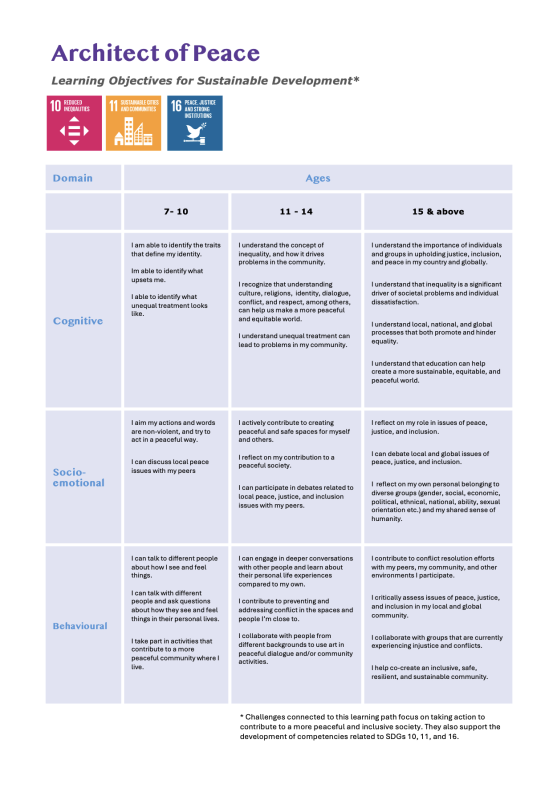
Interreligious Dialogue ‘s visual identity
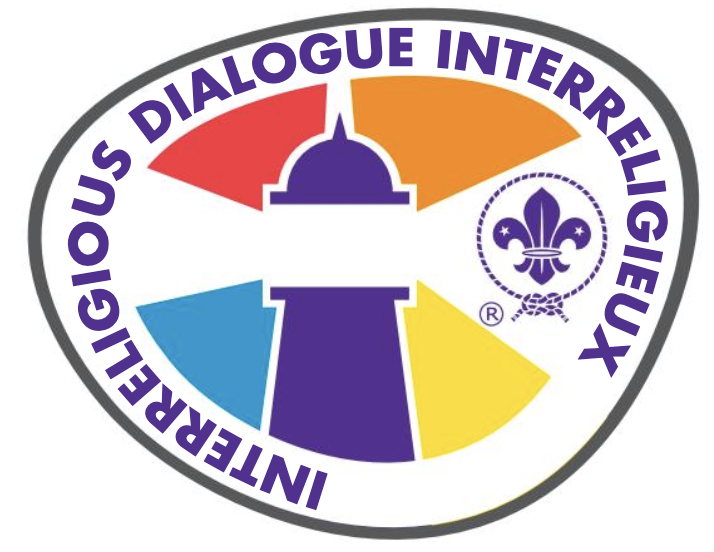
The badge features a lighthouse, symbolizing a safe space, a guide, and a place to rest as we rest in our spiritual beliefs. Its strong foundation encourages us to explore our faith, engage in our religious traditions, and fulfill our duties to God and ourselves.
The light from the lighthouse shines bright, as it is a guiding point visible from afar, reminding us to fulfill our duty towards others, understand and respect different spiritual and religious beliefs, and be kind and friendly in a world where different faiths and religions coexist.

